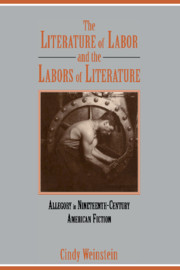 The Literature of Labor and the Labors of Literature
The Literature of Labor and the Labors of Literature Book contents
- Frontmatter
- Contents
- Acknowledgments
- Introduction
- 1 The Problem with Labor and the Promise of Leisure
- 2 Hawthorne and the Economics of Allegory
- 3 Melville's Operatives
- 4 Twain in the Man-factory
- 5 The Manikin, the Machine, and the Virgin Mary
- Afterword
- Notes
- Index
- CAMBRIDGE STUDIES IN AMERICAN LITERATURE AND CULTURE
4 - Twain in the Man-factory
Published online by Cambridge University Press: 06 July 2010
- Frontmatter
- Contents
- Acknowledgments
- Introduction
- 1 The Problem with Labor and the Promise of Leisure
- 2 Hawthorne and the Economics of Allegory
- 3 Melville's Operatives
- 4 Twain in the Man-factory
- 5 The Manikin, the Machine, and the Virgin Mary
- Afterword
- Notes
- Index
- CAMBRIDGE STUDIES IN AMERICAN LITERATURE AND CULTURE
Summary
Like Melville, Twain imagined the scene of writing to be inextricably connected to the scene of industrial production. And like Melville, Twain imagined that the act of inventing fictional characters for a literary economy was analogous to the act of producing laborers for a market economy. The relation between these scenes of production was even more vexed for Twain than for Melville. Twain in his capacity as entrepreneur continually shuttled back and forth between the two scenes, inventing characters to populate his fictions and constructing laborers to operate the machines in which he had invested. The encounter between these two scenes of production is itself written into Twain's texts. After all, what is the Man-factory of A Connecticut Yankee in King Arthur's Court if not a site both of the manufacturing of persons for Hank's market economy and for Twain's literary economy?
It is the powerful and productive encounter between these two scenes of producing persons that this chapter analyzes in order to map out Twain's own relation to the work ethic as it applied to literary labor and to delineate the economics of Twain's allegory. Whereas Melville's texts destabilized conventional oppositions between work and leisure in order to install a new notion of literary labor, Twain's texts interrogate traditional relations between efficiency and inefficiency in order to suggest that literary labor, particularly humorous literary labor, is subject to different notions of efficiency.
- Type
- Chapter
- Information
- The Literature of Labor and the Labors of LiteratureAllegory in Nineteenth-Century American Fiction, pp. 129 - 172Publisher: Cambridge University PressPrint publication year: 1995
- 8
- Cited by
